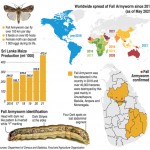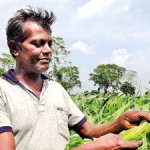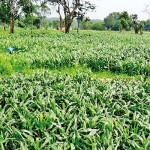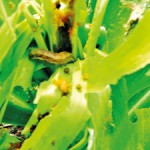News
Fall armyworm infestation endangers corn fields, once again
View(s):By Nadia Fazlulhaq
In the rural Horiwila area in Palugaswewa in the Anuradhapura District, corn farmers are once again facing a fall armyworm infestation.
They lament that more than 1,500 acres of corn cultivation have been attacked by the fall armyworm (locally called sena dalambuwa). Government officials are yet to visit the sites and provide support, they say.
Farmers complain that pesticides are not effective and they are trying their best to stop the pest from spreading further.
Corn farmer Wasantha Ajith Kumara said: “The money and sweat we invested are being destroyed in front of our eyes. Most farmers have sold their paddy stocks and pawned their jewellery for this cultivation.’’
- Farmers complain that pesticides are not effective against the pest
- More than 1,500 acres of corn cultivation have been attacked by the fall armyworm
Another farmer, Kasun Bandara, said that when the caterpillars destroyed the crop in 2018, the Government assured them of compensation, but they had not received any money.
The fall armyworm was first detected in the country in 2018 and more than 40,000 hectares were destroyed by the pest mainly in the Anuradhapura, Badulla, Ampara, and Monaragala districts.
Despite inviting Rwandan agriculture experts to tackle the menace, corn cultivation is once again under attack.
The Agriculture Department’s former director general, Dr. W.M.W. Weerakoon said the poultry industry depends heavily on local corn. “For both chicken and cattle feed, the country needs 552,000 metric tonnes of corn. A small amount goes for the production of Thriposha as well.’’
The Agriculture Ministry’s forecast for 2023 is 574,985 MT from 148,575 hectares.
Dr. Weerakoon said the department wants farmers to use biological, or low toxicity methods.
“The Rwandan agriculture experts wanted us to use highly toxic pesticides which we refused. Agricultural officers should always be on alert to inform farmers before it spreads rapidly,” he said.
The fall armyworm, which attacks corn fields, has been seen in rice-producing countries in
Asia as well.
K.G. Premathilake, professor in weed science at the Department of Export Agriculture at Uva-Wellassa University said: “One plant can have about 150-200 caterpillars. Due to the pesticide and herbicide ban, corn production was affected. If this is not controlled, corn production will drop,”
he said.
Prof. Premathilake said laboratory tests about controlling the fall armyworm using margosa and ginger have been successful. The Agriculture Ministry has been notified. “For now, there is no direct threat to paddy cultivation. But, there is always a risk with pests like this.’’
Agriculture Minister Mahinda Amaraweera told the Sunday Times he asked a team from the Agriculture Department in Peradeniya to visit the areas, assess the situation and provide solutions to corn farmers. He said officials were told to prevent the spread of the pest.
(Additional reporting and pix by Kanchana Kumara Ariyadasa)
The best way to say that you found the home of your dreams is by finding it on Hitad.lk. We have listings for apartments for sale or rent in Sri Lanka, no matter what locale you're looking for! Whether you live in Colombo, Galle, Kandy, Matara, Jaffna and more - we've got them all!





